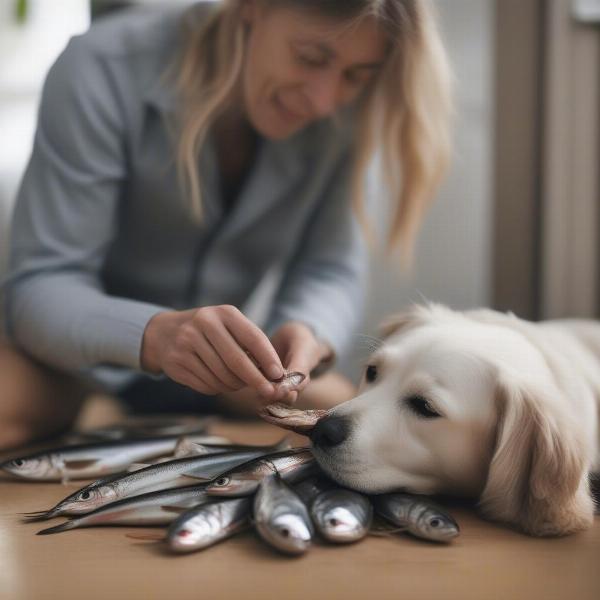Sardines are a powerhouse of nutrients packed into a tiny, affordable package, making sardine dog food an increasingly popular choice for pet owners. But what exactly makes these small fish so beneficial for our canine companions? This article dives deep into the world of sardine dog food, exploring its nutritional value, potential benefits, and how to safely incorporate it into your dog’s diet.
Unpacking the Nutritional Powerhouse: Why Sardines are Good for Dogs
Sardines are brimming with essential fatty acids, particularly Omega-3s EPA and DHA. These are crucial for maintaining healthy skin and coat, reducing inflammation, and supporting cognitive function. Beyond Omega-3s, sardines are also a fantastic source of protein, calcium, vitamin D, and coenzyme Q10 (CoQ10), an antioxidant that supports heart health. This rich nutritional profile makes sardines a valuable addition to a balanced canine diet.
Sardine Dog Food: Fresh, Canned, or Oil-Packed?
When considering sardine dog food, you have several options. Fresh sardines, while ideal, can be less convenient. Canned sardines, packed in water or oil, offer a readily available alternative. If choosing canned sardines, opt for those packed in water to avoid unnecessary added fats. However, if you choose sardines packed in oil, make sure it’s a healthy oil like olive oil. Avoid sardines packed in soybean oil or sunflower oil due to their higher omega-6 content, which can contribute to inflammation if consumed in excess.
Can Dogs Eat Sardines with Bones?
Yes, dogs can generally eat sardines with the bones, especially if they are small and soft. These small bones are a good source of calcium. However, always supervise your dog when feeding them sardines with bones, and consider removing larger bones for smaller breeds or puppies to prevent choking hazards. can dogs eat sardines with bones for more information on this topic.
 Dog eating sardines safely
Dog eating sardines safely
How to Incorporate Sardines into Your Dog’s Diet
Introducing sardines into your dog’s diet should be done gradually. Start with small amounts to assess for any allergies or digestive sensitivities. You can mix chopped sardines into their regular food, or offer them as a healthy treat. Remember, moderation is key. While sardines are nutritious, they should not replace a complete and balanced dog food. Consult with your veterinarian to determine the appropriate serving size for your dog’s breed, age, and health condition. sprats dog for information on another small fish that can be beneficial for dogs.
Sardines and Specific Health Conditions
While generally beneficial, it’s important to be mindful of certain health conditions when feeding sardines. Dogs with pancreatitis or a history of bladder stones should consume sardines cautiously due to their fat and purine content, respectively. Always consult with your veterinarian before adding sardines to the diet of a dog with pre-existing health concerns. salmon skin for dogs could be a good alternative if your dog has certain dietary restrictions.
Conclusion: Sardine Dog Food – A Healthy and Delicious Treat
Sardine dog food offers a wealth of nutritional benefits for dogs, from supporting healthy skin and coat to boosting cognitive function. By choosing the right type of sardines and introducing them gradually, you can safely incorporate this nutritious fish into your dog’s diet. Remember to consult your veterinarian for personalized advice and always prioritize a balanced and complete diet for your furry friend. fish oil supplements for dogs can be another way to provide similar benefits if your dog doesn’t enjoy sardines.
FAQ:
- Can puppies eat sardines? Yes, puppies can eat sardines, but start with very small amounts and ensure the bones are soft enough to chew.
- How often can I give my dog sardines? A few times a week is generally sufficient, but consult your veterinarian for specific recommendations.
- Are sardines good for senior dogs? Yes, the Omega-3s in sardines can be particularly beneficial for senior dogs by supporting joint health and cognitive function. triglyceride omega for dogs provides more information about omega fatty acids and their importance for dogs.
- What if my dog doesn’t like sardines? Try different preparations, like mashed or mixed with their regular food. You can also explore other sources of Omega-3s, such as fish oil supplements.
- Can I give my dog the oil from canned sardines? A small amount of oil from sardines packed in water is generally okay, but avoid excessive amounts, especially from oil-packed sardines.
- Are there any risks to feeding my dog sardines? While generally safe, some dogs may experience digestive upset or allergies. Always introduce new foods gradually.
- Can sardines replace my dog’s regular food? No, sardines should be used as a supplement or treat, not a replacement for complete and balanced dog food.
ILM Dog is a leading international pet website dedicated to providing expert advice on dog care and nutrition. We offer a wealth of information on various topics, from breed selection and health care to training and grooming. Our mission is to empower dog owners with the knowledge and resources they need to provide the best possible care for their furry companions. For personalized advice on dog nutrition, including incorporating sardine dog food, contact us at [email protected] or call +44 20-3965-8624. Visit ILM Dog for more valuable insights and expert guidance on all things dog-related.